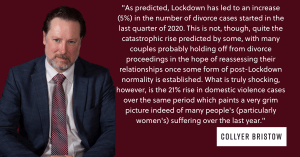- Family and divorce

Shorter Reads
English courts preferred in divorce for rigorous disclosure process
Our Family team comments on the contentious divorce proceedings between Channing Tatum and Jenna Dewan.
1 minute read
Published 24 May 2024
Key information
- Specialisms
- Private Wealth
- Services
- Family and divorce
In the contentious divorce proceedings between Channing Tatum and Jenna Dewan, Tatum accuses Dewan of causing delays that could increase her share of the post-separation growth of his Magic Mike franchise. This case highlights a common issue in high-profile divorces, where one party accuses the other of hiding assets or being less than forthcoming about their finances. Such allegations are not new and have been seen in other celebrity divorces involving figures like Sylvester Stallone and Vanilla Ice. In England and Wales, an estimated 30 percent of financial remedy cases involve some form of non-disclosure, whether real or imagined, despite the absolute duty on both parties to provide full and frank financial disclosure.
The rigorous financial disclosure process in England and Wales requires both parties to complete a comprehensive 30-page form known as “form E,” supported by documentation such as a year’s worth of bank statements. This process, aimed at ensuring fairness, has contributed to London’s reputation as the “divorce capital of the world.” Divorce lawyers often face the challenge of uncovering hidden assets by scrutinising bank statements, querying sources of expenditure, and tracing income flows. Penalties for non-disclosure can be severe, including substantial cost orders, assumptions of hidden assets by the court, reports to tax authorities, and even contempt of court charges leading to fines or imprisonment. Judges take financial disclosure very seriously, and those who attempt to hide assets often find that their efforts backfire.
Delays in the court system are common in both the UK and the US, exacerbated by financial pressures on the English court system. These delays can prolong the resolution of divorce cases, potentially benefiting the financially weaker spouse if the value of assets increases over time. The English court typically values assets at the time of the final hearing rather than at the time of separation, which can be advantageous in cases where asset values have risen post-separation. To avoid lengthy court delays, parties are encouraged to explore alternative dispute resolution methods such as mediation, arbitration, and private financial dispute resolution hearings. While these methods can be costly, they often lead to quicker resolutions than traditional court proceedings, providing a balance between fairness and efficiency in divorce settlements.
This is an article summary. Click here to read the full article that was first published by FT Adviser on 23 May 2024.
For more information, please visit our Family Lawyers page.
Related content
Shorter Reads
English courts preferred in divorce for rigorous disclosure process
Our Family team comments on the contentious divorce proceedings between Channing Tatum and Jenna Dewan.
Published 24 May 2024
Associated sectors / services
Authors
In the contentious divorce proceedings between Channing Tatum and Jenna Dewan, Tatum accuses Dewan of causing delays that could increase her share of the post-separation growth of his Magic Mike franchise. This case highlights a common issue in high-profile divorces, where one party accuses the other of hiding assets or being less than forthcoming about their finances. Such allegations are not new and have been seen in other celebrity divorces involving figures like Sylvester Stallone and Vanilla Ice. In England and Wales, an estimated 30 percent of financial remedy cases involve some form of non-disclosure, whether real or imagined, despite the absolute duty on both parties to provide full and frank financial disclosure.
The rigorous financial disclosure process in England and Wales requires both parties to complete a comprehensive 30-page form known as “form E,” supported by documentation such as a year’s worth of bank statements. This process, aimed at ensuring fairness, has contributed to London’s reputation as the “divorce capital of the world.” Divorce lawyers often face the challenge of uncovering hidden assets by scrutinising bank statements, querying sources of expenditure, and tracing income flows. Penalties for non-disclosure can be severe, including substantial cost orders, assumptions of hidden assets by the court, reports to tax authorities, and even contempt of court charges leading to fines or imprisonment. Judges take financial disclosure very seriously, and those who attempt to hide assets often find that their efforts backfire.
Delays in the court system are common in both the UK and the US, exacerbated by financial pressures on the English court system. These delays can prolong the resolution of divorce cases, potentially benefiting the financially weaker spouse if the value of assets increases over time. The English court typically values assets at the time of the final hearing rather than at the time of separation, which can be advantageous in cases where asset values have risen post-separation. To avoid lengthy court delays, parties are encouraged to explore alternative dispute resolution methods such as mediation, arbitration, and private financial dispute resolution hearings. While these methods can be costly, they often lead to quicker resolutions than traditional court proceedings, providing a balance between fairness and efficiency in divorce settlements.
This is an article summary. Click here to read the full article that was first published by FT Adviser on 23 May 2024.
For more information, please visit our Family Lawyers page.
Associated sectors / services
- Family and divorce
Authors
Need some more information? Make an enquiry below.
Subscribe
Please add your details and your areas of interest below
Article contributor
Toby
YerburghPartner - Head of Family Law
Specialising in Family & divorce
Enjoy reading our articles? why not subscribe to notifications so you’ll never miss one?
Subscribe to our articlesMessage us on WhatsApp (calling not available)
Please note that Collyer Bristow provides this service during office hours for general information and enquiries only and that no legal or other professional advice will be provided over the WhatsApp platform. Please also note that if you choose to use this platform your personal data is likely to be processed outside the UK and EEA, including in the US. Appropriate legal or other professional opinion should be taken before taking or omitting to take any action in respect of any specific problem. Collyer Bristow LLP accepts no liability for any loss or damage which may arise from reliance on information provided. All information will be deleted immediately upon completion of a conversation.
Close

















































